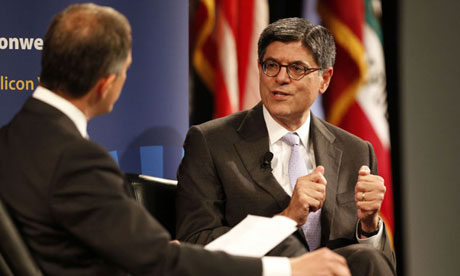US to hit debt ceiling in mid-October, Treasury secretary warns House GOP
Letter from Jack Lew says failure to act would do 'irreparable harm' and sets stage for further brinkmanship on Capitol Hill

Lew said the Treasury would reach its borrowing limit by mid-October and would then be left to fund the 80m payments per month. Photo: Beck Diefenbach/Reuters
The US will hit its borrowing limit in mid-October and would likely be unable to pay all its bills soon after, the Treasury warned on Monday.
In a letter to Republican House speaker John Boehner that sets the stage for another round of budgetary brinkmanship, Treasury secretary Jack Lew said: "Congress should act as soon as possible to protect America's good credit."
Lew warned failure to act soon could do "irreparable harm" to the US economy.
Government officials and economists had been expecting the US to reach its $16.69tn "debt ceiling" this autumn, but mid-October is earlier than some had expected.
The news comes as Congress prepares for yet another fight over whether or not to raise the debt ceiling in the coming weeks.
Lew said the Treasury would reach its borrowing limit by mid-October and would then be left to fund the 80m payments per month, including military salaries and social security cheques, with a cash balance estimated at $50bn.
"Operating the government with no borrowing authority, and with only the cash on hand on a given day, would place the United States in an unacceptable position," he wrote.
Lew said it was "not possible for us to estimate with any precision" when the Treasury would exhaust those funds if no agreement is reached. But he said such a situation could rapidly lead to a cash shortfall. "Indeed, such a scenario could undermine financial markets and result in significant disruptions to our economy," he wrote.
Last month, Boehner said: "We need significant cuts in spending if we are going to replace the sequester and extend the debt limit." The White House has said that it will not negotiate over whether the borrowing limit should be raised and has called on lawmakers to move quickly.
Political deadlock ahead of a debt ceiling raise in 2011 led to a historic downgrade of US debt and stock market panic.
Lew attempted to see off Republican arguments tying another rise in the debt ceiling to government spending. "Extending borrowing authority does not increase spending; it simply allows the Treasury to pay for expenditures Congress has previously approved," he wrote.
"Failing to raise the debt limit would not make these bills go away," he said. "It would, though, have disastrous effects for our nation."
The government hit its borrowing limit in May, but the Treasury has used emergency measure to buy more time. The debt ceiling was increased in early August as part of 2011's Budget Control Act, which also introduced across-the-board "sequester" cuts that began in March this year.
No comments:
Post a Comment